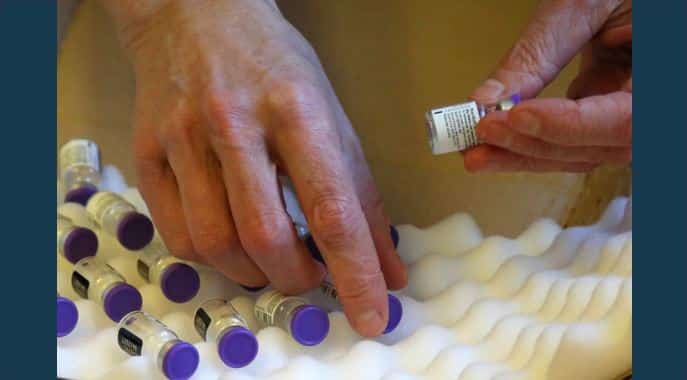Stephen Donnelly, Ireland's health minister, said in a tweet that the decision to suspend the vaccine was "a precautionary step" and based on "new information from Norway that emerged late last night."
Ireland's National Immunization Advisory Committee made the decision after Norway on Saturday reported four new cases of blood clotting and bleeding under the skin in adults under the age of 65 who were inoculated against COVID-19 with the the shot developed by AstraZeneca and Britain's Oxford University.
The advisory committee said there have been no such reports of blood clotting among those in Ireland who have received the AstraZeneca shot, of which more than 117,000 doses have been administered.
"The possible relationship between these events and the COVID-19 Vaccine AstraZeneca is uncertain and is being investigated," the National Immunization Advisory Committee said in a statement.
Karina Butler, chair of the committee, said they will monitor the situation and will reassess the suspension "if we can be satisfied that these events are coincidental."
"This vaccine is proven to be very effective against severe COVID-19 disease, which is associated with a risk of clotting events," Butler said. "We have taken this step out of an abundance of caution."
Norway had reported that one patient had died from an unexpected brain haemorrhage after receiving the vaccine and three others had developed "severe cases of blood clots or brain haemorrhages" who were administered the shot. The Norwegian Medicines Agency also said it has not concluded the medical issues are connected to the vaccine, "but due to the seriousness, these cases are being thoroughly investigated."
In response, the agency is asking those under 50 years of age who had the AstraZeneca vaccine in the past two weeks who feel increasingly unwell with large blue patches of skin indicating haemorraghes to consult a doctor as soon as possible.
The announcement of the cases follows similar incidents having been reported in European nations, with Denmark suspending use of the AstraZeneca vaccine late last week, citing "severe cases of blood clotting" in some recipients.
On Thursday, the European Medicines Agency said it has launched a full investigation into the reports of blood clots "as a precautionary measure."
AstraZeneca defended its vaccine on Sunday, stating its safety is backed by scientific proof while there is no evidence of an increased risk of blood clotting among those who have received the vaccine in any age group and in any country.
"Around 17 million people in the EU and UK have now received our vaccine, and the number of cases of blood clots reported in this group is lower than the hundreds of cases that would be expected among the general population," Ann Taylor, AstraZeneca's chief medical officer, said in a statement.
"The nature of the pandemic has led to increased attention in individual cases and we are going beyond the standard practices for safety monitoring of licensed medicines in reporting vaccine events, to ensure public safety."
The European Medicines Agency said as of Thursday 30 cases of blood clotting had been reported among some 5 million people vaccinated with the AstraZeneca vaccine in the EU, which is a rate "no higher than the number seen in the general population."







